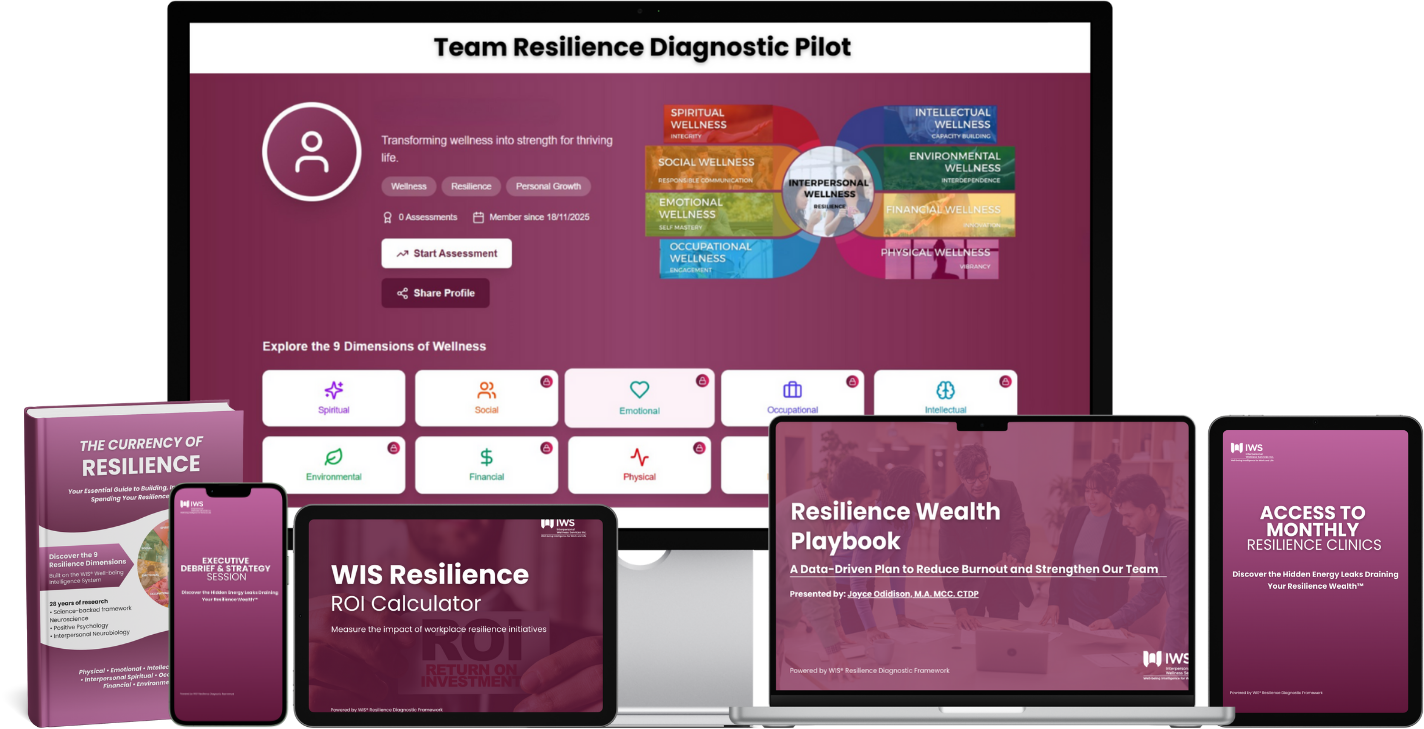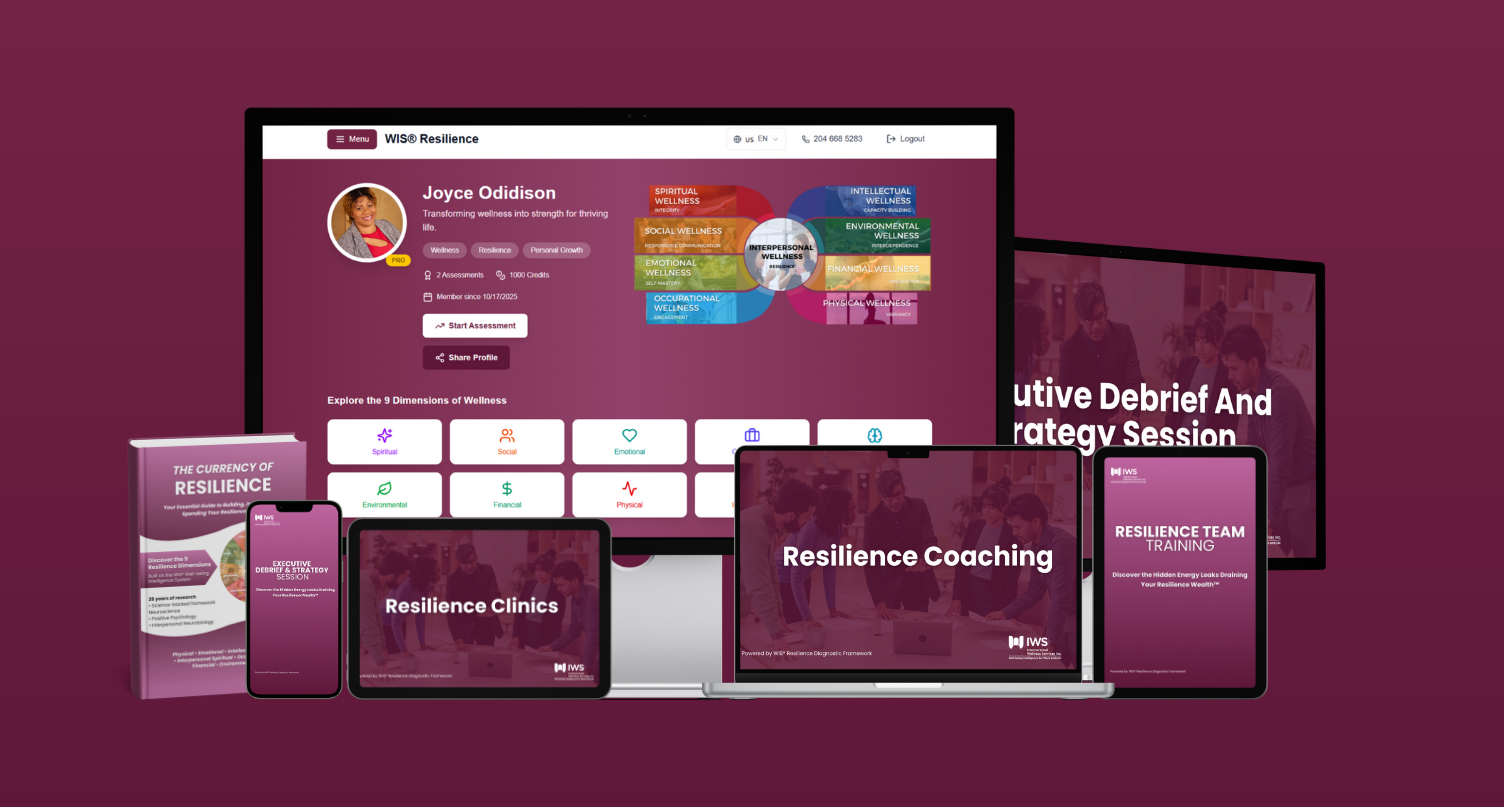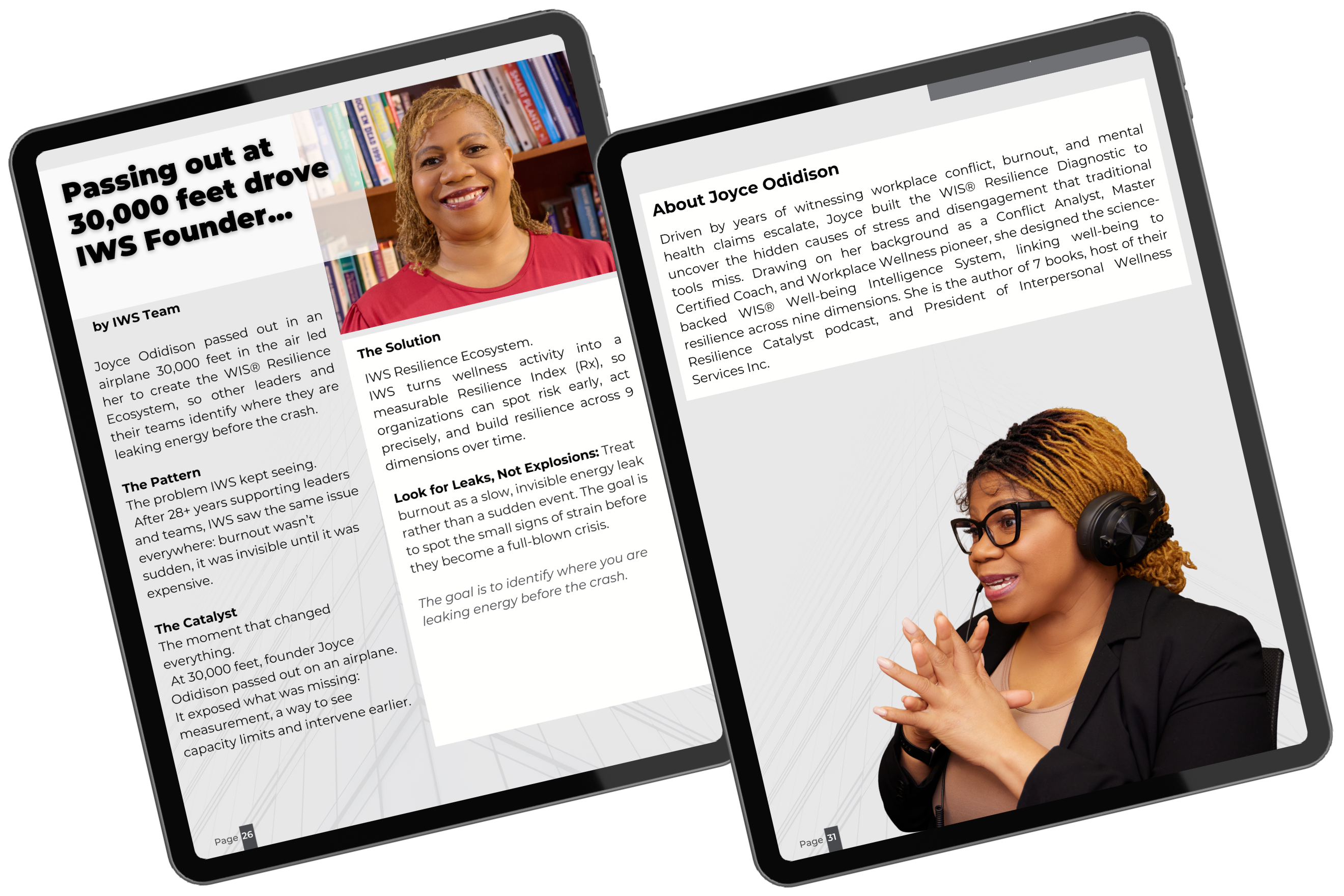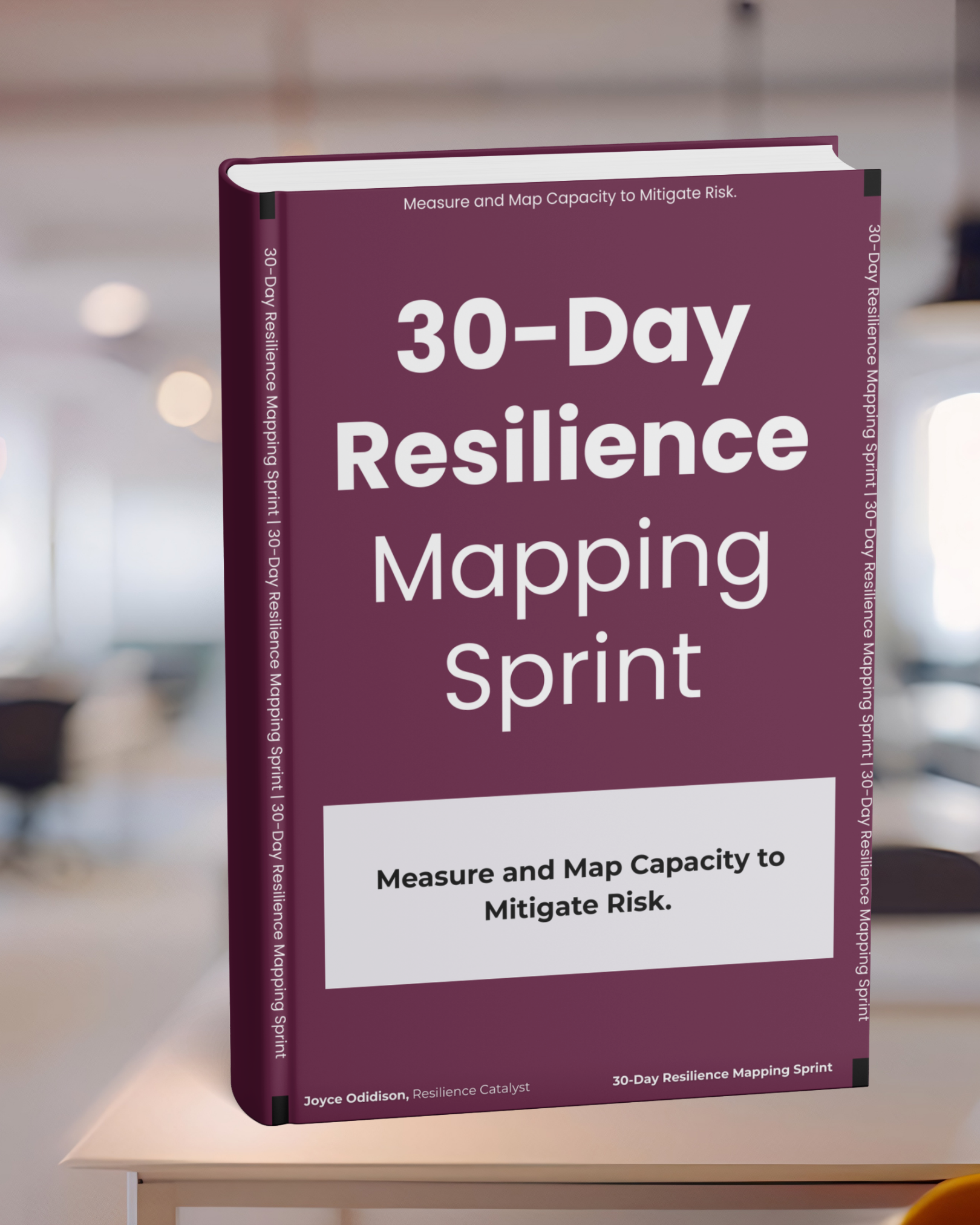See Early signs of Team Burnout, Workplace Conflicts, and Mental Health Risks.
Get leader-ready strategies that prevent
performance dips and rising health claims.

WIS® Resilience Index










































Interpersonal Wellness Services (IWS) offers a workplace resilience platform that measures capacity, burnout and mental health risks, maps hidden stressors, and builds team performance with diagnostics, micro-training, coaching, and KPI dashboards. Grounded on the Currency of Resilience™ framework and powered by the WIS® Well-being Intelligence System.
Built on 28+ years in workplace wellness, conflict resolution, and organizational resilience.
IWS Makes Resilience Visible, Then Gives you the Next Steps to Build it.

Burnout Risk Visibility
See rising risk by team, role, and site.

Precision Interventions
Move beyond generic wellness to targeted actions.

Culture & Retention KPIs
Track capacity, psychological safety, and progress.
30-Day Team Resilience Mapping Sprint
Measure and Map Capacity to Mitigate Risk
30-Day Team Resilience Anchors Sprint

Leaders, maximize your capacity for your teams to deliver consistently to execute Q1 goals
When deadlines tighten and workloads spike, performance drops because capacity gets drained, values slip out of sync, and trust quietly breaks down.
- Turn early strain into clear action before it becomes burnout, conflict, or missed targets.
The 30-Day Team Resilience Anchors Sprint
A rapid, diagnostic-driven sprint that helps you understand your team's resilience capacity to act fast, without guesswork.
- Measure resilience capacity across the team
- Spot risk patterns early
- Equip leaders with clear next steps
What you get in 30 days
Get decision-ready insight and targeted interventions for quick turnaround
- Baseline resilience capacity assessment (by cohort/team)
- Heatmap of aggregated risk patterns (by team/role/site)
- Leader-ready action plan with prioritized next steps
- Targeted interventions activated by Day 30
Simple rollout. Fast momentum.
- 1.Assess: Run the baseline resilience check for resilience anchors
- 2.See: Dashboards/heatmaps reveal where risk is rising
- 3.Act: Launch targeted supports and leader track actions for steady progress
Built for privacy and psychological safety
Employee results stay private. Leaders and organizations see aggregated, anonymized trends only—so support stays safe and stigma stays out.
Minimum thresholds apply to protect anonymity.
Why Resilience Anchors
Resilience Anchors provide an easy, safe, engaging entry point for employees. This Sprint starts with the Anchors, the foundation that protects behavior, follow-through, and mental stability under pressure.
- Low-friction entry for employees
- High clarity for leaders
- High awareness and ownership for employees
- Strong foundation for sustainable performance
Passing out at 30,000 feet drove IWS Founder...
Joyce Odidison passed out in an airplane 30,000 feet in the air led her to create the WIS® Resilience Ecosystem, so other leaders and their teams identify where they are leaking energy before the crash.

The problem IWS kept seeing
After 28+ years supporting leaders and teams, IWS saw the same issue everywhere: burnout wasn't sudden, it was invisible until it was expensive.

The moment that changed everything
At 30,000 feet, founder Joyce Odidison passed out on an airplane. It exposed what was missing: measurement, a way to see capacity limits and intervene earlier.

IWS Resilience Ecosystem
IWS turns wellness activity into a measurable Resilience Index (Rx), so organizations can spot risk early, act precisely, and build resilience across 9 dimensions over time.
Modern Resilience Requires a Measurable Approach.
Most programs increase awareness. WIS® increases capacity, because it measures what matters and turns insight into action.
AI at WIS: Product overview
1:38
Measure Capacity
(9D Assessment + Rx)
Most surveys measure opinion. WIS® measures resilience capacity across the whole person.
Map Risk
(Dashboards + Heatmaps)
See patterns by department, leader, role, and location—before problems become costly.
Build Resilience
(Micro-practices + Courses)
Assign targeted supports aligned to the exact dimension driving strain.
Sustain Change
(Coaching Hub + Progress Tracking)
Turn resilience into a coached, trackable process, not a one-time event.
See Risk Patterns Early, so You Can Intervene With Precision.
The Corporate Dashboard shows where burnout risk is rising and where engagement, trust, and stability are holding. Filter by department, leader, site/region, and role group to pinpoint what's driving strain.
- Identify overload hot spots and energy leaks
- Spot teams at risk of turnover and conflict
- Target interventions that reduce mental health strain
- Track change over time and prove ROI

Transforming Organizations, One Resilience Ecosystem at a Time.
WIS® supports resilient performance in environments with high pressure, rapid change, and people risk.
Government
Reduce burnout risk and restore execution reliability across departments.
High workload, public scrutiny, staffing constraints, and change fatigue can quietly erode capacity and trust.
What WIS® does:
- Maps resilience risk patterns by department, role group, and site
- Strengthens psychological safety and follow-through under pressure
- Guides targeted interventions without singling out individuals
Outcomes: Fewer escalation cycles • steadier performance • better retention
Earlier Risk Detection
Identify stress signals before stress leave or resignation
Psychological Safety
Stronger team norms and healthier workplace culture
Reduced Conflict
Minimize energy drain through targeted supports
Leadership Clarity
Improved retention signals and actionable insights
What Users are Saying About WIS® Resilience Index

Karen Kanigan
University of BC
"This simplifies the overwhelming complexity of workplace well-being with the WIS® Resilience Index™, making it measurable, practical, and actionable. She equips leaders with a clear pulse on resilience, empowering them to build healthier, stronger, and more profitable organizations."

Nasrin Ejner
Experiential Educator
"I truly enjoyed the Resilience Index session, it was meaningful and grounding. Exploring the Spiritual Dimension helped me reconnect with my purpose and peace. As a facilitator, I loved how theory and self-reflection were woven together so beautifully, it gave me a fresh perspective on how spirituality strengthens resilience."

Deb Robison
Director of Outreach & Collaboration, Miami University
"The WIS® tool is the foundation of our staff wellness program. It's holistic, insightful, and has energized our teams across the Ohio Mental Health Pilot Project."
Accelerate Resilience-Building With Guided Intelligence.
WIS® helps users move from insight to action faster, through targeted recommendations, dimension-aligned practices, and progress tracking.
Guided Next Steps
Dimension-based actions matched to Rx results
Micro-practice Engine
Small daily interventions that build capacity over time
Progress Tracking
Trend visibility for individuals, teams, and leaders
What Would Measurable Resilience Change for Your Organization?
Start with a clear Resilience Index (Rx) across 9 dimensions, then map risk, assign targeted supports, and track progress over time.
Small team? Start with Team Plan.



